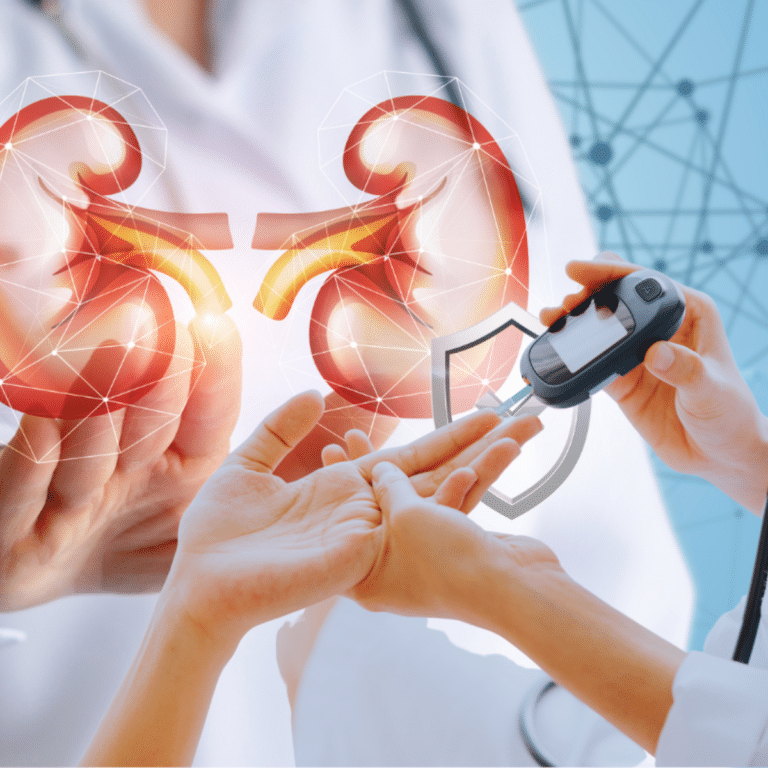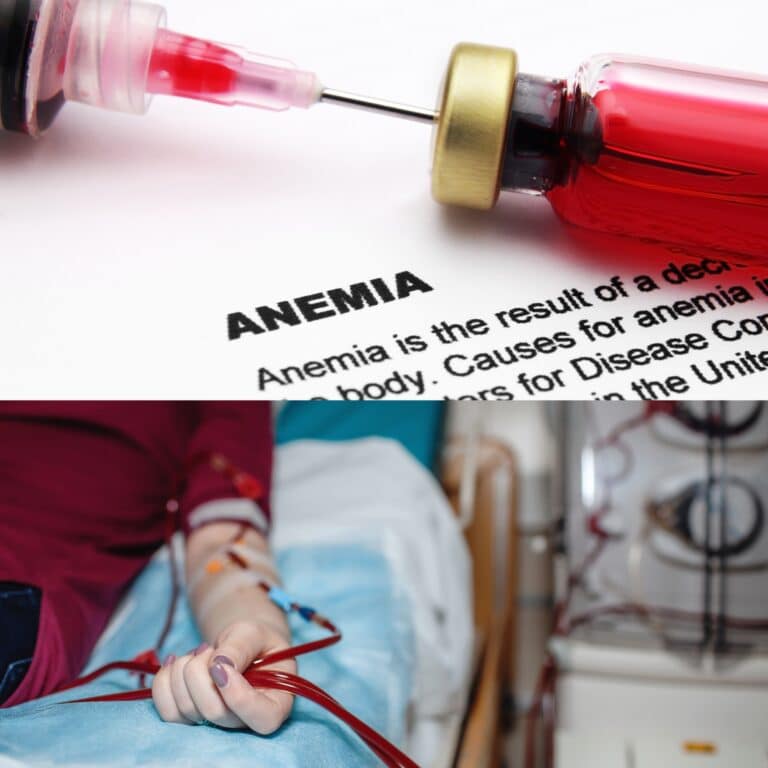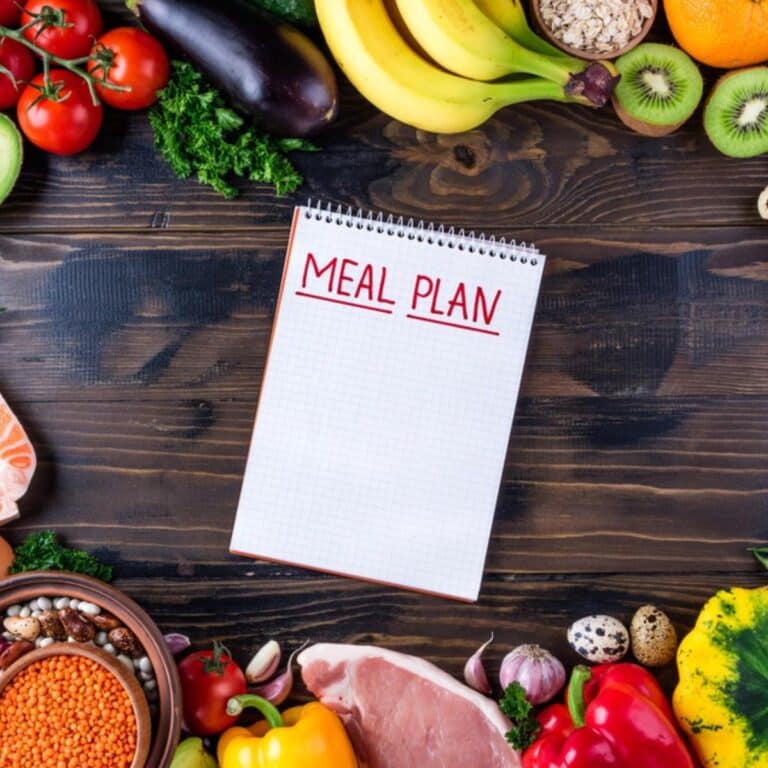How to Control Blood Pressure in CKD Patients
Hypertension (high blood pressure) is a serious medical condition for those with chronic kidney disease (CKD). It's also one of the most common causes of CKD (right behind diabetes).
According to a nationwide study encompassing a diverse sample of non-hospitalized American adults, it's approximated that hypertension affects 23.3% of individuals without CKD.
In contrast, its prevalence is notably higher in CKD patients: 35.8% in stage 1, 48.1% in stage 2, 59.9% in stage 3, and a substantial 84.1% in those at stages 4-5 of CKD (End-Stage Renal Disease).
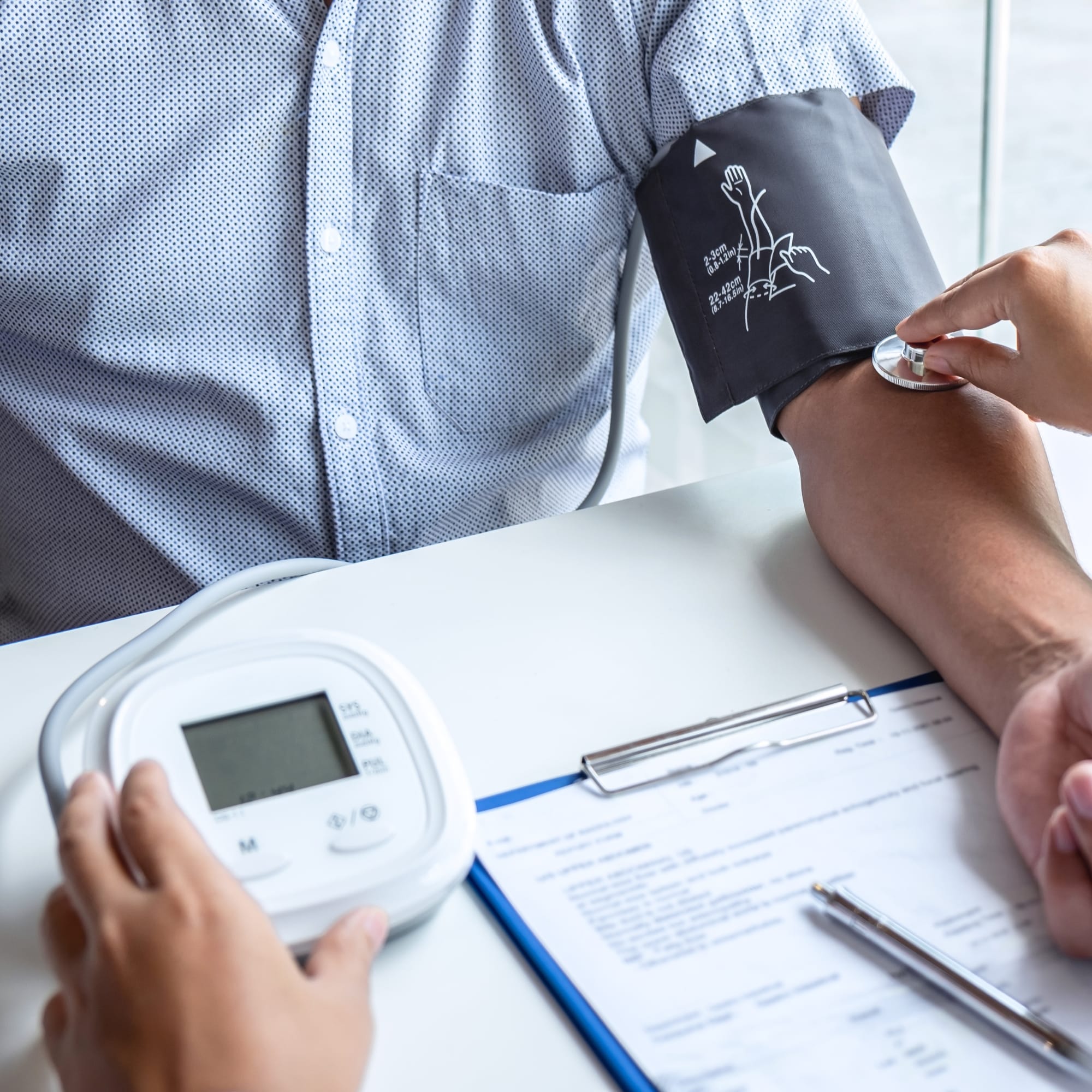
Whether your hypertension leads to your CKD or it's merely a side effect, it is important that you learn more about the condition in order to control it.
Jump to:
- Key Takeaways
- Understanding High Blood Pressure
- Kidney Disease and Hypertension
- Role of Body Weight in Blood Pressure Control
- Dietary Approaches for Hypertension
- Blood Pressure Ranges and Meaning
- High Blood Pressure Risks in CKD
- Lifestyle Modifications for CKD Patients
- Medications for Blood Pressure Management
- Additional Resources for CKD Patients
- Frequently Asked Questions
- Feel The Pressure to Control Your Blood Pressure
Key Takeaways
- Controlling blood pressure is crucial for CKD patients to slow the deterioration of kidney function.
- Lifestyle modifications, such as maintaining a healthy weight, following a balanced diet, and engaging in regular physical activity, can help control blood pressure hypertensive patients with kidney disease.
- Monitoring blood pressure regularly at home and recording readings can help CKD patients track changes and discuss them with their doctor.
- Pharmacological therapy with antihypertensive agents such as ARBs, ACE inhibitors, other RAS blockers, dihydropyridine calcium channel blockers and the like may be necessary to control blood pressure in patients with kidney disease, especially when lifestyle modifications alone are not effective.
For More Recipes and Ideas --->> Get Your Free Meals and Recipes That Are Perfect for Pre-Dialysis Diets, Pre-Dialysis with Diabetes, or Dialysis Diets.
Understanding High Blood Pressure
Understanding high blood pressure, or hypertension, is crucial if you're managing chronic kidney disease. This condition often silently increases the force of your blood against your vessel walls, posing a severe threat to your health.
Let's explore the definitions and types of hypertension and the dangers it presents, particularly in CKD patients.
Hypertension Definition and Types
Hypertension refers to persistently elevated blood pressure levels, where the force of blood against artery walls is consistently high. It's categorized into two types: primary (essential) hypertension and secondary hypertension.
Primary hypertension is the most common form, often developing gradually over time due to multiple factors like genetics, lifestyle choices, and age. Secondary hypertension arises abruptly and is caused by an underlying condition such as kidney diseases, hormonal disorders, or medication side effects.
Both types can lead to serious health complications if left untreated, emphasizing the importance of regular monitoring and management to reduce the risk of cardiovascular disease, stroke, and kidney damage.
Dangers of High Blood Pressure
High blood pressure, if left uncontrolled, poses severe health risks. It strains the heart, causing it to work harder, potentially leading to heart failure, myocardial infarction (heart attack), or stroke. Chronic hypertension damages blood vessels throughout the body, affecting organs like the kidneys, eyes, brain, and heart.
High blood pressure is no joke even for healthy people. When your blood has to be pumped harder through your body, your blood vessels must stretch in order to allow the increased flow.
Over time, the stretching weakens the blood vessels, including those in the kidneys. It's a leading cause of chronic kidney disease (hypertensive kidney disease), contributing to kidney damage and eventual advanced kidney disease and kidney failure.
Hypertension also accelerates atherosclerosis, the hardening and narrowing of arteries, leading to reduced blood flow to vital organs. Additionally, it raises the risk of aneurysms, vision loss, and cognitive decline. Managing blood pressure through lifestyle changes and antihypertensive treatment is crucial to mitigate these serious health complications.
When you have chronic kidney disease, high blood pressure can quicken the deterioration of your kidney function. Therefore, you will want to learn how to control your blood pressure in order to slow the damage being done to your kidneys.
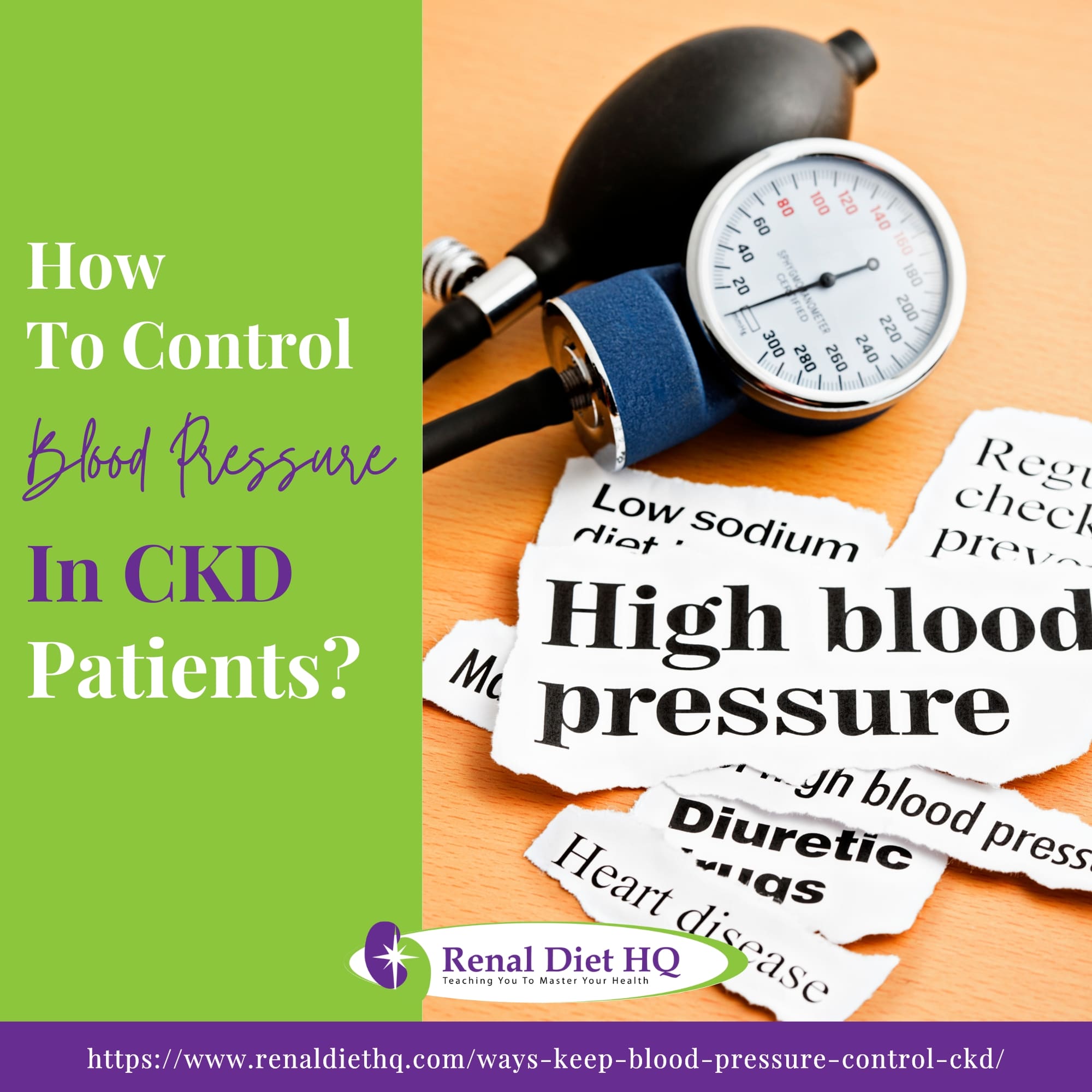
Kidney Disease and Hypertension
Understanding the relationship between hypertension and kidney disease is key in managing your blood pressure effectively. Hypertension can have a significant impact on your kidneys, potentially leading to chronic kidney disease if not properly managed.
We'll explore how to effectively monitor and manage your blood pressure to protect your kidney health.
Hypertension's Impact on Kidneys
Hypertension significantly impacts kidney health. High blood pressure damages the delicate blood vessels in the kidneys, impairing their ability to effectively filter waste and excess fluids. This damage disrupts the kidney's filtration process, causing protein and blood cells to leak into the urine, a condition known as proteinuria or hematuria.
Over time, chronic hypertension contributes to the development and progression of kidney disease, leading to decreased kidney function.
Elevated pressure within the renal blood vessels forces the kidneys to work harder, resulting in hypertensive nephropathy (hypertensive kidney disease), a condition marked by structural changes in the kidneys. These alterations hinder the organ's ability to regulate blood pressure effectively, creating a dangerous feedback loop that exacerbates hypertension and kidney damage.
Moreover, sustained high blood pressure reduces the blood flow to the kidneys, impairing their ability to eliminate waste and excess fluids, ultimately increasing the risk of kidney failure. Controlling blood pressure through lifestyle modifications and medications is crucial to prevent or slow down kidney damage caused by hypertension.
How CKD Leads to Hypertension
Chronic Kidney Disease often intertwines with hypertension, forming a complex interplay. As renal function declines in CKD, the kidneys struggle to regulate fluid volume and electrolyte balance. This triggers a cascade of physiological responses, including the activation of the renin-angiotensin-aldosterone system (RAAS), a critical regulator of blood pressure.
The compromised kidneys release higher amounts of renin, a hormone involved in blood pressure regulation, to compensate for their reduced function. Elevated renin levels initiate the production of angiotensin II, a potent vasoconstrictor that narrows blood vessels, subsequently increasing blood pressure.
Additionally, CKD disrupts the delicate balance of sodium and fluid excretion. The kidneys' diminished capacity to eliminate sodium can lead to fluid retention, contributing to hypertension. Furthermore, CKD-induced alterations in the kidneys' ability to regulate electrolytes like potassium can also impact blood pressure regulation.
This bidirectional relationship between CKD and hypertension forms a detrimental cycle—CKD contributes to hypertension, which, in turn, accelerates kidney damage. Managing blood pressure becomes crucial in CKD management to slow the progression of kidney disease and mitigate associated complications.
Role of Body Weight in Blood Pressure Control
Managing your weight plays a significant role in controlling blood pressure, especially for those with CKD. A reduction in weight, even by a small percentage, can offer incredible beneficial effects for your blood pressure control.
It's also vital to understand the importance of your Body Mass Index (BMI), as maintaining a BMI under 25 is often a key target in blood pressure management.
Weight Reduction Benefits
Weight reduction can significantly impact blood pressure control, especially in individuals with hypertension. Excess weight, particularly around the abdomen, increases the workload on the heart and blood vessels, elevating blood pressure. Shedding even a moderate amount of weight can reduce this strain, leading to notable improvements in blood pressure readings.
Weight loss helps decrease the body's total blood volume and reduces the resistance encountered by blood flow in the vessels. As a result, the heart doesn't have to work as hard to pump blood, leading to a decrease in systolic and diastolic blood pressure levels.
Moreover, weight loss often improves insulin sensitivity and reduces inflammation, both of which can positively impact blood pressure regulation. Even modest reductions in weight can yield additional benefits in managing hypertension, potentially reducing the need for medications and lowering the risk of associated poor cardiovascular outcomes.
Importance of BMI
BMI (Body Mass Index) is a widely used measurement to assess an individual's body weight in relation to their height. It's a simple calculation derived from dividing a person's weight in kilograms by the square of their height in meters. BMI is significant as it provides an estimate of body fat and helps categorize individuals into different weight classifications, offering insights into potential health risks associated with weight.
Here is a table outlining the BMI classifications:
| BMI | Classification |
| Below 18.5 | Underweight |
| 18.5 - 24.9 | Normal Weight |
| 25.0 - 29.9 | Overweight |
| 30.0 - 34.9 | Obesity (Class I) |
| 35.0 - 39.9 | Obesity (Class II) |
| Above 40.0 | Obesity (Class III) |
Though BMI is a useful screening tool, it doesn't differentiate between muscle and fat, potentially misclassifying individuals with higher muscle mass. Other factors like body composition and distribution of weight can also influence overall health risks. Therefore, while BMI is valuable, it's essential to consider it alongside other health indicators for a comprehensive assessment.
Dietary Approaches for Hypertension
Adjusting your diet can significantly impact your blood pressure levels, especially if you're managing CKD.
A key strategy is to adopt the DASH (Dietary Approaches to Stop Hypertension) eating plan, renowned for its beneficial effects on hypertension.
Part of this diet is dietary sodium restriction, as excess salt can exacerbate high blood pressure and further strain your kidneys.
DASH Eating Plan
The DASH diet focuses on heart-healthy eating to lower blood pressure. Its components emphasize nutrient-rich foods, particularly:
- Fruits and Vegetables: High in potassium, magnesium, and fiber, these support lower blood pressure and overall heart health.
- Whole Grains: Rich in fiber and nutrients, they aid in controlling blood pressure and promoting satiety.
- Lean Protein Sources: Lean meats, poultry, fish, nuts, seeds, and legumes offer essential nutrients without excessive saturated fats.
- Low-Fat Dairy: Provides calcium, potassium, and magnesium with reduced saturated fats, benefiting blood pressure control.
- Limited Sodium: Lowering dietary sodium intake is crucial in the DASH diet to manage blood pressure. Reducing processed foods and seasoning with herbs and spices instead of salt helps achieve this.
The DASH diet emphasizes a balanced and varied intake of these food groups to reduce cardiovascular risk, promote heart health, and maintain overall well-being.
Reducing Sodium Intake
Reducing sodium in a renal diet to control hypertension involves strategic meal planning:
- Limit Processed Foods: Processed items like canned soups, deli meats, and fast food often contain high sodium levels. Opt for fresh or homemade alternatives.
- Read Labels: Check food labels for sodium content and choose low-sodium or sodium-free options. Aim for products with less than 140 mg of sodium per serving.
- Cook from Scratch: Preparing meals from fresh ingredients allows better control over sodium content. Use herbs, spices, and lemon juice for flavor instead of salt.
- Rinse Canned Foods: Rinsing canned vegetables, beans, or fish can reduce sodium by up to 40%.
- Limit Condiments: Condiments like soy sauce, ketchup, and salad dressings are often high in sodium. Use sparingly or opt for low-sodium versions.
By being mindful of ingredient choices and cooking methods, one can effectively lower sodium intake, helping manage hypertension in a renal diet.
Blood Pressure Ranges and Meaning
In managing your blood pressure as a CKD patient, it's key to comprehend the meaning behind blood pressure ranges. Understand that these numbers aren't arbitrary, but indicators of your hypertension risks and your heart's health.
Let's explore what these figures mean and how they impact your condition.
Understanding Blood Pressure
A healthy blood pressure is 120/80 or anything below. The top number is the systolic pressure, which signifies how hard the heart is beating to push blood through your blood vessels. The bottom number, the diastolic pressure, represents the pressure when your blood vessels are relaxing between beats.
If your top number gets above 139 or your bottom number above 90, you are said to have hypertension. A systolic pressure between 120-139 or a diastolic pressure between 80-89 is known as pre-hypertension.
Blood pressure targets may differ due to specific factors in individual patients, but most healthy people are advised to keep their blood pressure at 120/80 or lower.
Hypertension Definition and Risks
Blood pressure categories classify levels of hypertension based on systolic and diastolic readings. Here is a table outlining these categories:
| Blood Pressure Category | Systolic mm Hg (Upper Number) | Diastolic mm Hg (Lower Number) |
| Normal | Less than 120 | Less than 80 |
| Elevated | 120 - 129 | Less than 80 |
| High Blood Pressure (Stage 1) | 130 - 139 | 80 - 89 |
| High Blood Pressure (Stage 2) | 140 or higher | 90 or higher |
| Hypertensive Crisis | Higher than 180 | and/or higher than 120 |
Understanding these categories is crucial for diagnosing and managing hypertension. Monitoring blood pressure regularly helps prevent complications associated with high blood pressure.
Immediate medical attention is necessary during a hypertensive crisis, as it indicates a severe health risk. Consulting a healthcare professional is essential for appropriate diagnosis, monitoring, and optimal treatment based on individual readings.
High Blood Pressure Risks in CKD
As someone managing Chronic Kidney Disease (CKD), it's crucial for you to understand the risks associated with high blood pressure. Hypertension can significantly impact your kidneys, accelerating the kidney disease progression if not effectively controlled.
In the following section, we'll explore these risks in detail, and discuss how you can prevent further kidney damage through effective blood pressure management.
Hypertension's Impact on Kidneys
In managing your CKD, it's crucial to realize that high blood pressure can significantly damage your kidneys, leading to a heightened risk of serious health complications.
Hypertension plays a destructive role in kidney function. Here's how:
- Prolonged hypertension can cause kidney damage, impairing their ability to filter waste and maintain fluid and salt balance.
- It affects your blood vessel health, making them narrow, stiff, or block, hindering blood flow.
- Hypertension treatment is paramount in CKD management. It slows kidney disease progression and reduces risk factors.
- Uncontrolled high blood pressure can exacerbate the impaired kidney function, leading to CKD or escalating your current condition.
- Maintaining a healthy blood pressure is vital in preserving kidney health and overall wellbeing.
Preventing CKD Progression
Managing your blood pressure effectively can greatly reduce the risk of progression of CKD and help maintain your kidney health. Prevention strategies include both lifestyle modifications and proper medication use.
You can benefit from dietary modifications such as reducing sodium intake and maintaining a balanced diet, which play vital roles in preventing kidney disease progression. The role of exercise is also crucial, with regular physical activity known to help lower blood pressure.
Regarding medications, they're an essential part of blood pressure management strategies. However, affordability can sometimes be an issue. If that's the case, discuss this with your healthcare provider who might have solutions to make your medication more affordable.
Always remember, controlling your blood pressure is key to protecting your kidneys.
Lifestyle Modifications for CKD Patients
As a patient with CKD, it's critical to realize how your lifestyle can affect your condition. Simple changes to your diet and physical activity levels can have a significant impact on your blood pressure and overall kidney health.
Let's explore how dietary modifications and exercise can help manage your blood pressure and CKD effectively.
Dietary Changes Impact
Dietary changes play a pivotal role in managing both chronic kidney disease (CKD) and hypertension. For CKD, a kidney-friendly diet involves moderating protein, phosphorus, potassium, sodium, and fluid intake. Similarly, managing hypertension entails reducing sodium intake, adopting the DASH diet rich in fruits, vegetables, and low-fat dairy, and controlling overall calorie and fat intake.
These dietary adjustments alleviate strain on the kidneys, reduce fluid retention, and help regulate blood pressure. A balanced diet with limited processed foods, adequate hydration, and portion control supports kidney function and aids in controlling blood pressure.
Here are some lifestyle measures that you can take:
- Limit your daily sodium intake.
- Incorporate more fruits and vegetables into your meals.
- Opt for lean proteins like chicken and fish.
- Limit your alcohol and caffeine consumption.
- Stay hydrated but monitor your fluid intake if advised by your doctor.
Collaborating with healthcare providers or dietitians ensures personalized dietary plans, optimizing kidney health and contributing to effective blood pressure management.
Exercise and CKD
Regular exercise is a key lifestyle modification you can make to manage your blood pressure if you're living with CKD. The potential benefits of exercise are numerous: it boosts heart health, aids weight loss, and reduces stress, all factors in controlling blood pressure.
But exercise guidelines must be followed. Always consult your healthcare provider before starting a new exercise regimen. They can help you understand exercise precautions specific to your condition.
In general, aim for moderate exercise intensity. This means you should be able to talk, but not sing, during activity. As for exercise duration, start with 15 minutes daily, gradually increasing to 30 minutes.
Incorporate aerobic activities like brisk walking, cycling, or swimming into your routine. These exercises help lower blood pressure and improve heart health.
It's also important to include strength training exercises at least two days a week. These activities help build muscle, which aids in burning more calories, even while at rest.
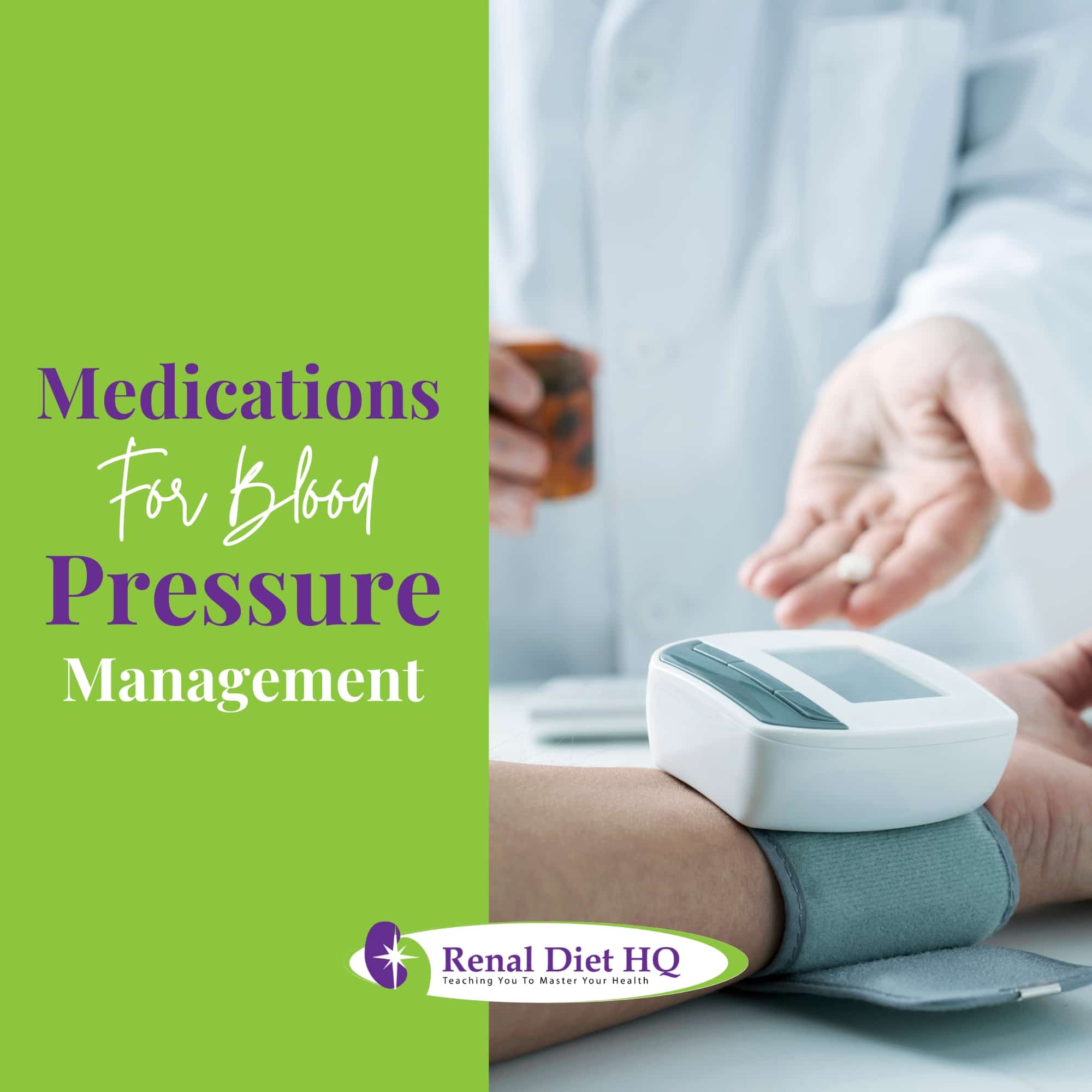
Medications for Blood Pressure Management
Managing blood pressure often requires a multi-faceted approach, and medications play a crucial role as standard treatment of hypertension in achieving optimal control. Understanding the diverse range of medications available, their mechanisms, and how they complement lifestyle changes is essential for effective hypertension management.
This section delves into the various classes of blood pressure medications, their functions, potential adverse effects, and the significance of adherence to prescribed treatments in maintaining healthy blood pressure levels.
Medications for Hypertension
For managing your high blood pressure, especially with CKD, it's essential you're familiar with effective medications that can help. These can work in tandem with lifestyle modifications, dietary interventions, and home monitoring.
Here's a table summarizing common medications for hypertension, their actions, and potential side effects:
| Medication Class | Action | Potential Side Effects |
| Angiotensin-Converting Enzyme Inhibitors (ACE-Is) | Relax blood vessels, reduce stress on the heart | Cough, elevated potassium, kidney problems |
| Angiotensin Receptor Blockers (ARBs) | Dilate blood vessels, lower blood pressure | Dizziness, elevated potassium, reduced kidney function |
| Calcium Channel Blockers | Relax blood vessels, lower heart rate | Swelling, constipation, headache |
| Diuretics | Remove excess sodium and water from the body | Frequent urination, electrolyte imbalances |
| Beta-Blockers | Lower heart rate, decrease cardiac output | Fatigue, cold extremities, dizziness |
| Alpha-Blockers | Dilate blood vessels, lower blood pressure | Dizziness, rapid heartbeat, headache |
These medications target various aspects of blood pressure regulation, but each can lead to specific adverse effects, highlighting the importance of personalized treatment plans.
Importance of Adherence to Hypertension Medications
Adherence to antihypertensive therapy is critical for CKD patients with hypertension due to the direct impact on kidney health. Consistent medication intake helps maintain stable blood pressure levels, reducing the strain on the kidneys and slowing the progression of kidney disease.
Adequate control of blood pressure prevents further damage to the delicate blood vessels within the kidneys, preserving their function.
Non-adherence can lead to uncontrolled hypertension, increasing the risk of kidney damage, cardiovascular disease, and complications. For CKD patients with hypertension, already vulnerable to kidney-related issues, this becomes especially crucial.
Adhering to prescribed medications, following a healthcare provider's guidance, and regularly monitoring blood pressure ensures optimal management of hypertension in CKD, potentially delaying the need for therapeutic options in the form of renal replacement therapy (e.g., dialysis or kidney transplantation).
Maintaining consistency with prescribed medications significantly supports kidney health and overall well-being in individuals with CKD and hypertension.
Additional Resources for CKD Patients
Managing your blood pressure as a CKD patient can be challenging, but you're not alone in this journey.
There are numerous support groups and educational materials available online to guide you.
These resources provide practical tips, insights from experts, and the opportunity to connect with others navigating similar health challenges.
Support Groups Availability
In your journey with CKD, you're not alone; there are numerous support groups available to provide you with additional resources and guidance. These groups offer many benefits such as shared experiences, emotional support, and practical advice.
Here are a few resources you might find helpful:
- Online Support Options: Websites like the National Kidney Foundation offer forums where you can share experiences and advice.
- Peer Support Advantages: Connecting with others who understand your struggles can be incredibly therapeutic.
- Community Resources: Local health clinics often have information about support groups in your area.
- Counseling Options: Therapists or counselors can provide strategies to manage stress and anxiety.
- Educational Materials: Many support groups provide valuable information about managing CKD and controlling blood pressure.
Stay connected, stay informed, and remember, you're not alone.
Online Educational Materials
Navigating through your CKD journey, you'll find a wealth of online educational materials that can serve as additional resources to help achieve adequate blood pressure control. These online resources include:
- Educational videos that provide step-by-step guides on lifestyle modifications and diet changes.
- Interactive modules that offer a hands-on approach to understanding the link between CKD and blood pressure.
- Webinars hosted by health professionals sharing the latest research and tips.
E-learning courses are another great way to deepen your knowledge about CKD and blood pressure management. These courses typically include modules, quizzes, and opportunities to interact with instructors and fellow learners.
Frequently Asked Questions
Common symptoms of high blood pressure in CKD patients include persistent headaches, shortness of breath, chest pain, and visual disturbances. Additionally, individuals may experience fatigue, confusion, and irregular heartbeat.
However, high blood pressure in CKD patients often remains asymptomatic until advanced stages, emphasizing the importance of regular blood pressure monitoring for early detection and management.
Yes, certain foods can aid in managing high blood pressure for CKD patients. Potassium-rich foods like bananas, spinach, and sweet potatoes can assist in regulating blood pressure. Additionally, foods high in omega-3 fatty acids, such as fatty fish like salmon or flaxseeds, may have a positive impact.
Supplements like coenzyme Q10, garlic extract, and omega-3 fatty acid supplements might also help, but it's crucial for patients to consult healthcare providers before incorporating supplements due to potential interactions or contraindications.
Stress can exacerbate high blood pressure in CKD patients, impacting kidney function. Stress prompts the release of hormones that can elevate blood pressure. Managing stress through relaxation techniques like deep breathing, meditation, or yoga can aid in reducing blood pressure.
Regular exercise, adequate sleep, maintaining a healthy diet, and seeking support from counselors or support groups also help manage stress. It's vital for CKD patients to adopt stress-relieving practices to support overall health and blood pressure management.
Blood pressure medications for CKD patients, like ACE inhibitors or diuretics, may lead to side effects. These can include electrolyte imbalances, notably high potassium levels (hyperkalemia), resulting from potassium-sparing diuretics. ACE inhibitors may cause a persistent dry cough or a temporary rise in serum creatinine.
Additionally, there might be a risk of dizziness, fatigue, or a drop in blood pressure. Regular monitoring and consulting healthcare providers help manage and mitigate these side effects.
Hypertension in CKD patients isn't typically curable but can be effectively managed. Lifestyle modifications, dietary changes, and medication help control high blood pressure. However, in some cases, underlying kidney damage causing hypertension might be irreversible.
Yet, managing blood pressure can significantly slow rate of decline in kidney function. Regular monitoring, adhering to treatment plans, and addressing underlying kidney conditions are vital for long-term blood pressure control and kidney health in CKD patients.
Feel The Pressure to Control Your Blood Pressure
It's crucial to understand high blood pressure's impact on managing chronic kidney disease. Hypertension quietly raises blood force against vessel walls, posing grave health risks. This article helped you navigate hypertension definitions, its risks, especially for CKD patients, and the crucial need for management.
High blood pressure is a serious threat, straining the heart, damaging vessels, and escalating CKD by harming kidneys' filtration. Effective control involves lifestyle changes, understanding blood pressure readings, and medication adherence.
Empowering CKD patients with these insights helps protect kidneys and overall well-being. Remember, controlling blood pressure is paramount in safeguarding your health.






